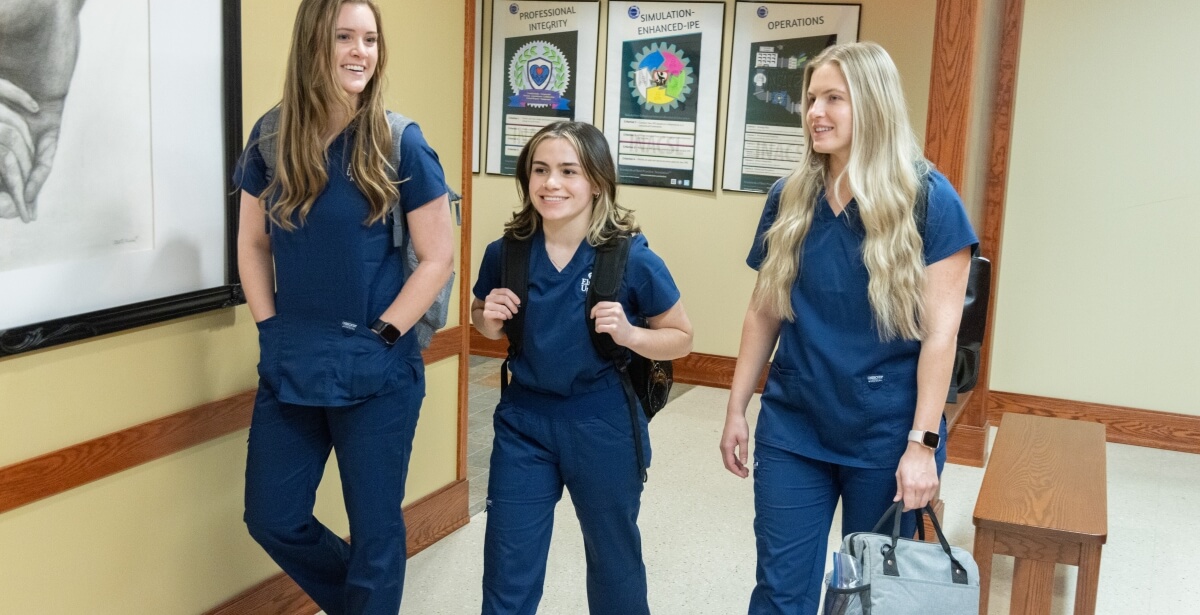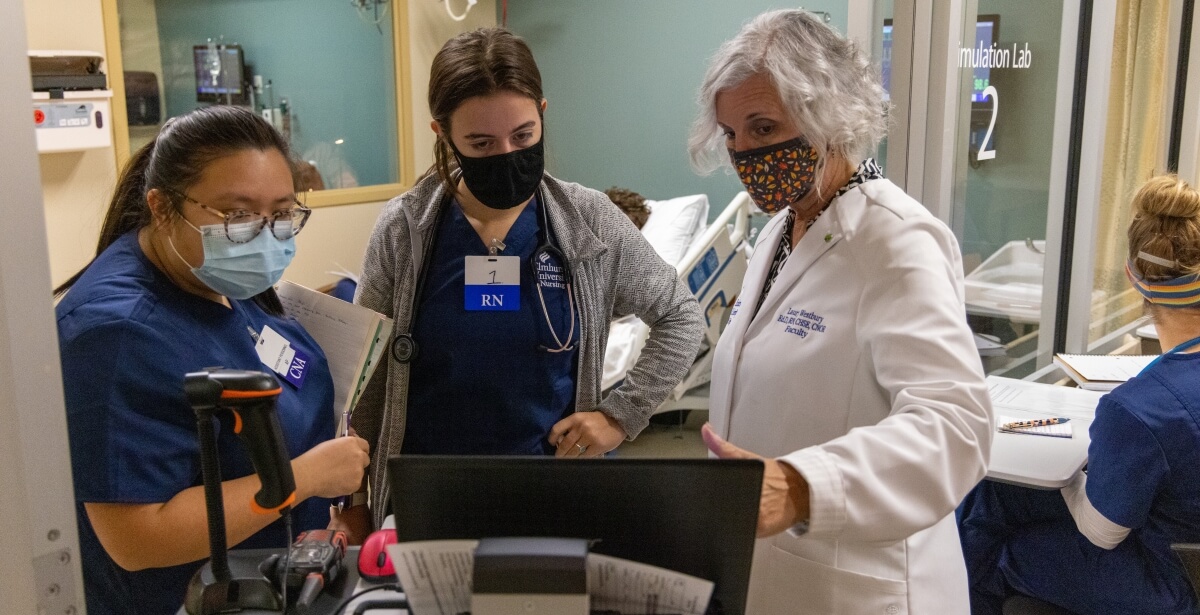How to Choose a Nursing School

The U.S. Bureau of Labor Statistics (BLS) projects a 6% growth in registered nursing roles between 2021 and 2031. While 6% may not seem like substantial growth, this estimate means that registered nurses will be needed to fill 203,200 roles through 2031. Now, more than ever, Hospitals and clinics across the United States are seeking new nurses to meet patient needs.
With this increasing demand for new nurses, the need for training and more accessible options like online programs has also increased. Sorting through the plethora of nursing programs can seem daunting.
With so many factors to consider, we’re here to walk through how to choose a nursing school, including considerations such as:
- Is Nursing School for Me?
- How Do I Become a Nurse?
- Does This Nursing Program Fit My Personal and Professional Goals?
- Does It Matter Where I Get My Degree?
- How Do I Choose the Right Nursing Program?
You’ll more easily find a nursing school if you know why choosing the right nursing school matters. But first, let’s look at if nursing school is right for you and then explore the ins and outs of choosing a nursing degree.
Is Nursing School for Me?
There are many reasons why professionals choose nursing school over other educational options. A survey of nursing students identified personal and professional explanations for their career choices. Participants shared the following motivations for pursuing nursing careers:
- “I want to help people who need assistance but cannot help themselves.”
- “My grandma got seriously ill, and I spent a lot of time at the hospital and hospice; that situation inspired me to do this.”
- “My mom used to work at the hospital. I’ve always had contacts with the hospital, and I liked it.”
You may be following in a relative’s footsteps, looking for a way to help your community or simply looking for new challenges. The high demand for registered nurses means we’ll need career-changing professionals to fill important roles. If you’ve answered yes to “is nursing school for me?,” you should also consider if you are ready to take the steps necessary to become a nurse.
Admissions Considerations
We’ll see that a bachelor's degree in nursing is the first step toward a nursing career. Aspiring nurses will need to meet application requirements before gaining admission to undergraduate programs. The typical Bachelor of Science in Nursing (BSN) program sets admission requirements including:
- Minimum cumulative GPA on previous coursework
- Successful completion of college-level prerequisites
- High school diploma for traditional BSN or bachelor’s degree for accelerated BSN (ABSN)
You should also consider the financial aspects of a nursing degree before applying for admission. Nursing education comes with high upfront costs but great return on investments. Each university offers financial assistance information for prospective students.
How Do I Become a Nurse?
The question “is nursing school for me?” leads to follow-up questions on how to become a nurse. Registered nurses are highly-skilled medical professionals who help their patients make important health decisions every day. You’ll need the right combination of education and licensing before entering nursing
Degree Options
The BSN has become the common entry point into registered nursing careers. This degree typically takes four years to complete and builds the foundations for successful nursing careers. An ABSN allows students with prior bachelor’s degrees to fast-track their studies and complete their BSN degree in as little as 16 months. Graduates of BSN and ABSN programs are then prepared for the National Council Licensure Examination (NCLEX) necessary for future licensure.
Employers increasingly require new nurses to enter the workplace with BSN degrees in hand. The 2020 National Nursing Workforce Survey found a 7.8% growth in nurses with a BSN as their highest degree from 2013 to 2020. There were decreases in diploma (-5.6%) and associate degrees (-4.3%) as the highest degrees over the same period. BSN-educated registered nurses demonstrate improved patient outcomes and stronger critical thinking and leadership skills.
Graduate options like the Master of Science in Nursing (MSN) and Master’s Entry in Nursing Practice (MENP) prepare professionals for more advanced nursing roles. A two-year MSN degree is designed for experienced nurses, while a MENP is designed for students who completed undergraduate degrees in non-nursing fields.
State Licensure
Each state establishes a standard for registered nursing licensure. We’ll use the initial licensure process for Illinois to illustrate post-graduate requirements for nurses. With your degree in hand, you can complete the following steps for licensure:
- Registering and passing the NCLEX
- Completing an online application
- Submitting an Education Form filled out by your nursing program director
- Providing criminal history and receipt for fingerprint services
The growth in telehealth and online education means many registered nurses possess licensure in multiple states. Twenty-four percent of respondents to the 2020 National Nursing Workforce Survey reported current multi-state licenses. The most common reasons for multi-state licensure included:
- Physical cross-border practice (33.1%)
- Telehealth (15.8%)
- Distance education (8.2%)
Post-Graduate Career Paths
The most common career path for a BSN or ABSN graduate is registered nursing. The BLS estimated a median salary of $77,600 for registered nurses in May 2021. This salary is far above the median salary of $45,760 for all occupations listed by the BLS.
An estimated 46% growth in nurse practitioner employment by 2031 drives higher pay for these professionals. The BLS found a median salary of $120,680 for nurse practitioners in May 2021. Learn more on how to become a nurse practitioner here.

Does It Matter Where I Get My Nursing Degree?
Nursing programs are not created equal, and it’s important to consider your personal and professional needs. With hundreds of options available, you should choose a nursing school that best fits your goals. Here are a few characteristics to consider when finding good nursing schools.
Building Skills for the Workplace
A bachelor’s or master’s degree in nursing builds the skills necessary to help patients of all ages in fast-moving environments. You’ll want to find a nursing school with courses that simulate realistic clinical settings. Faculty with experience as nurses or nurse practitioners share their knowledge of tasks including:
- Assessing and documenting patient conditions
- Administering treatments
- Collaborating with physicians and other nursing staff
- Educating patients on at-home treatment and health improvement
While researching schools that are good for nursing, you should also consider the quality of clinical experiences. Nursing students must complete hundreds of hours in clinical settings to turn classroom lessons into finely honed skills. When choosing a nursing school, a good question is if the school offers extensive help with clinical placements.
Traditional vs. Online
Traditional nursing programs require on-campus course attendance with limited opportunities for virtual learning. Conventional programs also require clinical experiences close to the university. These requirements may limit your options when choosing a nursing school.
Online BSN and MSN programs reduce the costs and stress of moving elsewhere to pursue your career. You can complete the required coursework wherever you are rather than relocating for school. Choosing a nursing school that will help with clinical placements in your community is also possible.
Fast-Track Degrees
Another consideration in your search for a nursing school is accelerated or fast-track degree options like the ABSN. If you’ve completed a degree in another field, you might want to leverage these experiences while pursuing another profession. Fast-track nursing degrees maintain high academic standards but streamline experiences through shorter course lengths.
Accreditation and Passage Rates
A nursing school’s reputation for academic excellence can boost career prospects for its graduates. NCLEX pass rates are among the metrics used by the Commission on Collegiate Nursing Education (CCNE) for program certification. Nursing school applicants should also look for CCNE certification as they research potential programs.
Faculty and Staff
Faculty members, student advisors and other staff members elevate student experiences. The best nursing schools center staff interactions on student success. Students who choose Elmhurst University for their nursing education also benefit from faculty members with extensive academic and clinical experience.

Choosing Elmhurst University for Your Nursing Education
Elmhurst University offers online degree options for professionals switching to nursing careers. The online Accelerated BSN and online MENP degrees build on previous educational experiences in training future nurses. Dedicated advisors and experienced faculty guide students toward the best degree for their career needs.
Online Accelerated BSN students can complete their coursework, clinical hours and on-campus residency in as little as 16 months. This immersive curriculum requires 60 credit hours, 450+ clinical hours and two on-campus residencies before graduation. Students prepare for the NCLEX with courses like:
- Adult Health I and II
- Family Health: Childrearing
- Synthesis: Adult Health III Complex Care
Professionals aspiring to clinical nursing leadership roles can opt for the online MENP program. This direct-entry master’s degree is the first of its kind in the United States and can be completed in 20 months. Online MENP candidates complete 850+ clinical hours, one on-campus residency and 71 credit hours on topics including:
- Epidemiology and Biostatistics
- Family Health Nursing
- Technology in Health Care Education and Practice
Head to the online Accelerated BSN and online MENP program pages for more on how Elmhurst University can help you start your nursing career.

